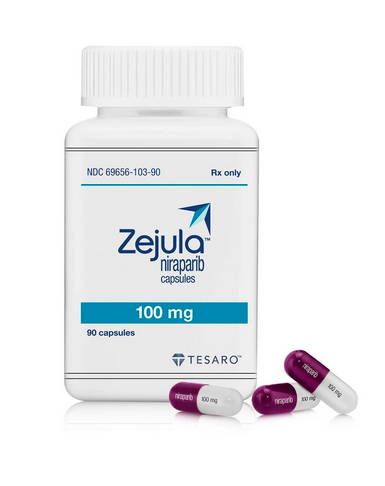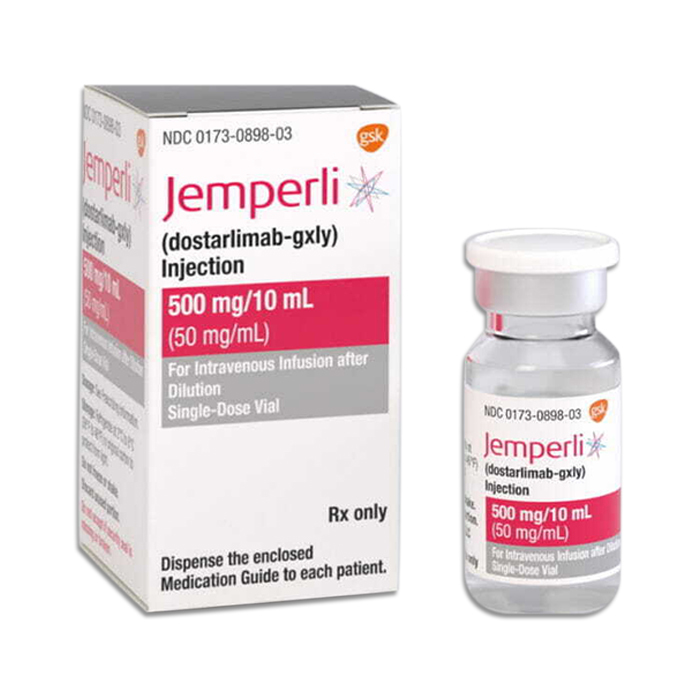Zejula (niraparib) vs Jemperli (dostarlimab)
Zejula (niraparib) vs Jemperli (dostarlimab)
Zejula (niraparib) is a type of medication known as a PARP inhibitor, primarily used for the maintenance treatment of adult patients with recurrent epithelial ovarian, fallopian tube, or primary peritoneal cancer who are in a complete or partial response to platinum-based chemotherapy. Jemperli (dostarlimab) is an anti-PD-1 therapy, a type of immunotherapy, used for the treatment of adult patients with mismatch repair-deficient (dMMR) recurrent or advanced endometrial cancer that has progressed on or following prior treatment with a platinum-containing regimen. The choice between Zejula and Jemperli would depend on the specific type of cancer, its molecular characteristics, the patient's previous treatments, and overall health, and should be made in consultation with a healthcare provider who can evaluate the individual's unique clinical situation.
Difference between Zejula and Jemperli
| Metric | Zejula (niraparib) | Jemperli (dostarlimab) |
|---|---|---|
| Generic name | niraparib | dostarlimab |
| Indications | Ovarian, fallopian tube, or primary peritoneal cancer | Endometrial cancer, solid tumors with mismatch repair deficiency (dMMR) |
| Mechanism of action | Poly (ADP-ribose) polymerase (PARP) inhibitor | Programmed death receptor-1 (PD-1) blocking antibody |
| Brand names | Zejula | Jemperli |
| Administrative route | Oral | Intravenous |
| Side effects | Nausea, thrombocytopenia, fatigue, anemia, constipation | Fatigue, anemia, diarrhea, nausea |
| Contraindications | Hypersensitivity to niraparib or any of its components | Hypersensitivity to dostarlimab or any of its components |
| Drug class | PARP inhibitor | PD-1 inhibitor |
| Manufacturer | GlaxoSmithKline (GSK) | GlaxoSmithKline (GSK) |
Efficacy
Zejula (Niraparib) Efficacy in Gynecological Cancer
Zejula (niraparib) is a poly(ADP-ribose) polymerase (PARP) inhibitor used for the treatment of certain gynecological cancers, including ovarian, fallopian tube, and primary peritoneal cancers. It is particularly effective in patients who have a somatic or germline BRCA mutation. Clinical trials have demonstrated that niraparib significantly improves progression-free survival (PFS) in patients with recurrent ovarian cancer. In the NOVA trial, a pivotal Phase 3 study, niraparib substantially extended PFS in patients with recurrent ovarian cancer who were in response to platinum-based chemotherapy, regardless of BRCA mutation status. However, the greatest benefit was observed in patients with a BRCA mutation.
For maintenance therapy, niraparib is approved for use in the first-line setting after a response to platinum-based chemotherapy. The PRIMA study showed that niraparib significantly improved PFS compared to placebo in a broad population of patients with newly diagnosed advanced ovarian cancer following a response to first-line platinum-based chemotherapy, including those with homologous recombination deficiency (HRD) positive and HRD-negative tumors. This suggests that niraparib may offer a robust maintenance therapy option for a wide range of patients with advanced ovarian cancer.
Jemperli (Dostarlimab) Efficacy in Gynecological Cancer
Jemperli (dostarlimab) is a programmed death receptor-1 (PD-1) blocking antibody indicated for the treatment of endometrial cancer that has progressed on or following prior treatment with a platinum-containing regimen and is mismatch repair deficient (dMMR), which is a type of gynecological cancer. The efficacy of dostarlimab was evaluated in the GARNET trial, a multi-cohort, multicenter, non-randomized, open-label trial. In this trial, dostarlimab demonstrated a meaningful objective response rate (ORR) in patients with dMMR recurrent or advanced endometrial cancer, with a significant proportion of patients achieving complete or partial response.
Furthermore, the duration of response (DOR) with dostarlimab in the GARNET trial was notable, with many patients maintaining their response for six months or longer. This indicates that dostarlimab can provide durable responses in a subset of patients with advanced endometrial cancer that is dMMR. It is important to note that the approval of dostarlimab for this indication is under accelerated approval based on tumor response rate and durability of response. Continued approval for this indication may be contingent upon verification and description of clinical benefit in confirmatory trials.
Regulatory Agency Approvals
Zejula
-
European Medical Agency (EMA), European Union

-
Food and Drug Administration (FDA), USA

-
Health Canada

-
Therapeutic Goods Administration (TGA), Australia

Jemperli
-
European Medical Agency (EMA), European Union

-
Food and Drug Administration (FDA), USA

Access Zejula or Jemperli today
If Zejula or Jemperli are not approved or available in your country (e.g. due to supply issues), you can access them via Everyone.org.
How it works

Make an enquiry
Choose the medicine you want to buy, answer a couple of questions, and upload your prescription to speed things up. We’ll get back to you within 24 hours.


Make an enquiry
Choose the medicine you want to buy, answer a couple of questions, and upload your prescription to speed things up. We’ll get back to you within 24 hours.


Breeze through the paperwork
We'll guide you through the required documents for importing unapproved medicine, ensuring you have all the necessary information.


Get a personalized quote
We’ll prepare a quote for you, including medicine costs and any shipping, administrative, or import fees that may apply.


Receive your medicine
Accept the quote and we’ll handle the rest - sourcing and safely delivering your medicine.

Some text on this page has been automatically generated. Speak to your physician before you start a new treatment or medication.
Let's talk
If you have any questions, call us or send us a message through WhatsApp or email:
Contact us




